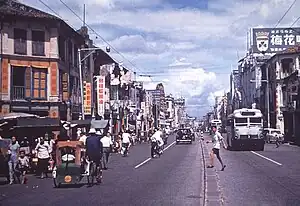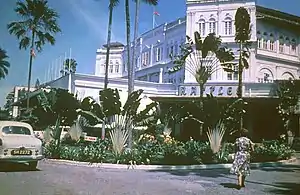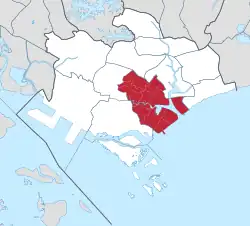Singapore | |
|---|---|
City | |
| City of Singapore | |
  .jpg.webp)    From top left to right: South Bridge Road, Victoria Theatre and Memorial Hall, Supreme Court Building, Building, Raffles Hotel, City Hall and the Singapore River in the 1960s. | |
 The Central Area (in red) of Singapore today, mostly corresponds with the former city from 1965. | |
| Coordinates: 1°17′30″N 103°51′00″E / 1.29167°N 103.85000°E | |
| Country | (1951–1963) (1963–1965) |
| State | (1951–1959) (1959–1965) |
| Government | |
| • Type | City council |
| • Mayor | Ong Eng Guan |
| Area | |
| • Total | 17.84 km2 (6.89 sq mi) |
| Demonym | Singaporean |
| Time zone | UTC+7:30 (MALT) |
| Postal districts | 1, 6, 7, 8, 9 |
The City of Singapore existed between 1951 and 1965 in the Colony of Singapore, a British Crown colony and later in the State of Singapore within Malaysia, with the City Council as the governing authority. Before 1951, the City Council was known as the Municipal Commission.[1] The rest of the crown colony was under the authority of the Singapore Rural Board.
History
Creation and subsequent elections
In the 1948 and 1951 general elections in Singapore, constituencies were drawn along the boundary of the Municipal Commission and the Rural Board, each area was subdivided into a number of constituencies.[2][3]
The municipality was then conferred with city status by a royal charter from King George VI on 22 September 1951, when Singapore was then a Crown colony.[1] The original Municipal Commission was therefore renamed as the City Council, and the Municipal Building was renamed City Hall.
Between the 1957 election and the phasing out of the city, Ong Eng Guan of the People's Action Party (PAP) was the mayor as the leader of the largest party within the City Council. Ong went on to become Minister of National Development under Lee Kuan Yew's premiership.
Dissolution
After the PAP gained power following the 1959 general election and formed the first government after self-government was granted to the Crown colony, the city was phased out, with powers transferred to statutory boards.[4]
In 1965, upon Singapore's expulsion from Malaysia, the Republic of Singapore Independence Act 1965 provided the following clause which empowered the President to abolish the City Council and the Rural Board, with the powers of the local authorities assumed by the Government.
President may by order make such modifications in any written law as appear to him to be necessary or expedient in consequence of the abolition of the City Council and of the Rural Board and of the assumption of the powers of the local authorities by the Government.
Legacy
Today, the Central Area, which sits in the south-eastern corner of Singapore, mostly corresponds with what was once the City of Singapore.
See also
References
- 1 2 "City day". Singapore Infopedia. National Library Board.
- ↑ "Singapore Legislative Council General Election 1948". Archived from the original on 24 January 2023. Retrieved 27 March 2015.
- ↑ "Singapore Legislative Council General Election 1951". Archived from the original on 27 July 2020. Retrieved 27 March 2015.
- ↑ "Singapore Elections".